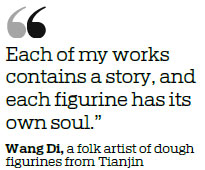Tianjin native spreads dough-making bliss with lifelike figurines
TIANJIN - For most Chinese, dough is only used to make noodles, dumplings and steamed buns. This is not the case for 71-year-old Wang Di, who can turn dough into lifelike figurines.
Wang, a folk artist of dough figurines, mixes wheat flour, glutinous rice flour and preservatives in a container. She slowly adds water, then steams the dough for about 20 to 25 minutes.
"It usually takes me two to three hours to finish the preparation work," Wang said as she pulled out a lump of thumb-sized dough to check its elasticity. "The proportion of each ingredient should be just right."

To make a figurine's head, Wang sprinkles flesh-colored pigment into the dough and kneads it into a small ball. She uses a piece of a plastic knife to carve and mold the outline of the chin, nose and eyes in just several minutes.
"I imagine the expression of a figurine in my mind and depict it in the dough until I am satisfied," Wang says, connecting the figurine's body parts together and dressing the lady in her hands with dough-made qipao, a classic one-piece and tight-fitting Chinese dress for women.
Wang has created female figurines ranging from classic fairies and characters in famous novels to ethnic genres with exotic styles. Some of the figurines look smart and lively, while some look quiet and at ease.
Wang, born in 1948 in northern China's Tianjin, is an inheritor of the intangible cultural heritage of dough figurine making, which can be traced back to the Han Dynasty (202 BC-220 AD).
People first made food from dough, shaped like butterflies and lotus flowers, to celebrate traditional festivals. As time went on, it became a traditional handicraft art.
When she was a little girl, Wang said she was fond of painting. "I loved to copy portraits of ladies from comic books, and I continued this hobby during my school days," she recalled.
In her 30s, Wang found another art form to show the beauty of Chinese ladies - dough figurines. Since she worked at a local medical college, drawing and making models of human bodies, Wang quickly grasped the skills required.

She began to look for inspiration from classical Chinese legends, myths and novels such as A Dream of Red Mansions.
The majority of figurines Wang has created look cozy and optimistic. "I hope to keep myself delighted, while also bringing happiness and tranquility to my audience," she said.
Wang has visited related exhibitions to greater absorb the dough-crafting experience. "When I learned about an exhibition being held in Beijing, I would rush there early in the morning," Wang says.
In 1988, Wang held a small solo exhibition, and to her surprise, she received high praise from many experts. "I have gained more confidence since then."
Wang was devoted to making dough figurines and soon made her name around the world. She has visited more than 20 countries and regions to spread Chinese traditional dough figurine art.
In 2000, during her visit to Texas in the United States, Wang taught more than 1,000 US students how to make dough figurines.
"They loved it and showed great enthusiasm. Some little kids pushed their way through the crowd to follow my teaching steps," Wang said. Some foreigners also sent her emails and looked forward to visiting China to learn the art.
"Each of my works contains a story, and each figurine has its own soul," Wang said, adding that the art of dough figurines is inspired by life. "Being able to learn, inherit and spread this art, I feel honored and proud."
Xinhua
(China Daily 08/08/2019 page17)














